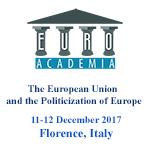Euroacademia Conferences
 Europe Inside-Out: Europe and Europeanness Exposed to Plural Observers (9th Edition) April 24 - 25, 2020
Europe Inside-Out: Europe and Europeanness Exposed to Plural Observers (9th Edition) April 24 - 25, 2020 Identities and Identifications: Politicized Uses of Collective Identities (9th Edition) June 12 - 13, 2020
Identities and Identifications: Politicized Uses of Collective Identities (9th Edition) June 12 - 13, 2020 8th Forum of Critical Studies: Asking Big Questions Again January 24 - 25, 2020
8th Forum of Critical Studies: Asking Big Questions Again January 24 - 25, 2020 Re-Inventing Eastern Europe (7th Edition) December 13 - 14, 2019
Re-Inventing Eastern Europe (7th Edition) December 13 - 14, 2019 The European Union and the Politicization of Europe (8th Edition) October 25 - 26, 2019
The European Union and the Politicization of Europe (8th Edition) October 25 - 26, 2019 Identities and Identifications: Politicized Uses of Collective Identities (8th Edition) June 28 - 29, 2019
Identities and Identifications: Politicized Uses of Collective Identities (8th Edition) June 28 - 29, 2019 The European Union and the Politicization of Europe (7th Edition) January 25 - 26, 2019
The European Union and the Politicization of Europe (7th Edition) January 25 - 26, 2019 7th Forum of Critical Studies: Asking Big Questions Again November 23 - 24, 2018
7th Forum of Critical Studies: Asking Big Questions Again November 23 - 24, 2018 Europe Inside-Out: Europe and Europeanness Exposed to Plural Observers (8th Edition) September 28 - 30, 2018
Europe Inside-Out: Europe and Europeanness Exposed to Plural Observers (8th Edition) September 28 - 30, 2018 Identities and Identifications: Politicized Uses of Collective Identities (7th Edition) June 14 - 15, 2018
Identities and Identifications: Politicized Uses of Collective Identities (7th Edition) June 14 - 15, 2018
The Cacophonic Concert of Europe: Between Nationalism and Grand Strategy
-
-

-
Presentation speakers
- Wolfgang Danspeckgruber, Liechtenstein Institute on Self-Determination at Princeton University
- Uriel Abulof, Liechtenstein Institute on Self-Determination at Princeton University
Abstract:
Humans need to belong, and search for communities in order to live and interact with each other according to a certain set of norms and regulations that preserve and protect their families. Thus, self-determination – one’s right, and capacity, to determine his or her own private, and communal, destiny – has a potent role to play in postmodern politics in and beyond Europe. Still, the means by which self-determination is pursued are neither static nor monolithic. These days, aspirations and claims to self-determination can be transmitted globally in real-time; as a result, the troubles of one community can very quickly be communicated to and by others. When the interaction of men and women and across generations is also taken into account, local politics becomes potentially global in real-time. These factors do make a difference, as they invite outside interference and render effective crisis management much more difficult. By extension, the construction of grand strategy is all the more necessary, but harder to achieve – as the unfolding situations in Catalonia, Scotland and Kurdistan demonstrate. With today’s apparent endless succession of international crises, we need to bring fresh insights to bear on the political conversation in our less-than-golden age. The problems and crises concerning self-determination and strategy, as well as the state and its various forms, have become ever more relevant, fundamental, and far reaching. This paper will discuss these multifaceted challenges, and explore whether there is a future for “self-determining Europe,” and whether this could serve as a vision for a new, regional, grand strategy.
-
Related Presentations

The European Union Crisis as a Crisis of Equality
- Mario Juarez-Garcia

What is the ‘Wright’ Modernism of the Mid-Century Cold War? American Design in Mid-Century Cold War Propaganda
- Heather Elisabeth













